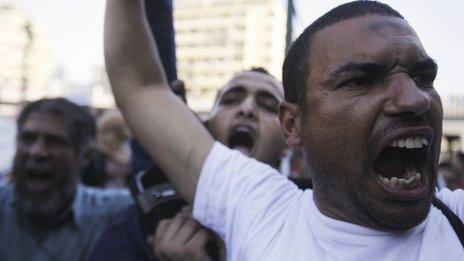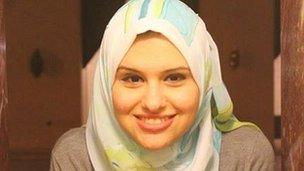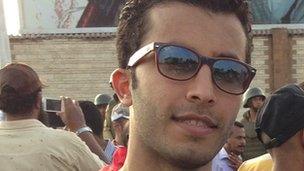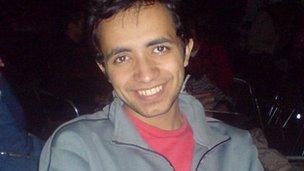Egypt crisis: Your experiences
- Published

Muslim Brotherhood supporters make their feelings known in Giza Square, Cairo
Egypt's interim government has continued to crack down on Islamists, following the arrest of the leader of the Muslim Brotherhood, Mohammad Badie,
The situation remains tense, with almost 900 people killed in the violence since Wednesday.
Here, people from different standpoints reflect on the state of the country.
Basma El Baz, Cairo

We are hoping that the army and police are able to take control. We are afraid of attacks from the Muslim Brotherhood.
The Muslim Brotherhood are attacking those that disagree with them. They consider themselves to be true Muslims, they attack Christians and also attack other Muslims that may disagree with what they are doing in Egypt.
I was always sceptical about them. And now the Egyptian people have discovered the truth about the Muslim Brotherhood, they are also against them. They are oppressing us.
A country like Egypt should respect everyone, but they preach hatred for any opponents.
People are still really really afraid. My work is far from my house, so I feel safer staying at home in case anything happens while I am away. Friends of mine are also staying at their homes.
Sherif Madkour, Alexandria

On Friday morning we had buried someone from Alexandria who had died during protests in Cairo. We headed to Smouha and prayed before our protest. It was a very big protest and thugs, sent by the army, began to attack us. No-one was hurt, but we soon heard that the army were on their way.
The army arrived and started shooting at us. People were falling around me, and I saw more than 10 people die in front of me. I carried a man who had been shot in the neck.
We headed to a mosque but were told to leave as it wasn't safe there. We left and were still under fire. Machine guns mounted on cars started to be used, so a friend and I ran down a street to escape.
There is still a tense atmosphere in Alexandria. On Sunday, we were told not to attend protests as there were lots of snipers on the roofs. The army imprisoned one of my friends, saying that he had weapons in his bag. All he had was a camera.
I support the Muslim Brotherhood, they are protesting peacefully.
We have the right to choose our president and our parliament. This is not a democracy, where is my voice?
Mahmoud Ali, Cairo

Egypt has been living in hard times since the coup, people have been killed at every protest.
I am not pro-[former President Mohammed] Morsi and was protesting against him during the demonstrations on 30 June, but I am also against the heavy-handed nature of the army and security forces.
People have had the right to protest in the streets without fear.
Yesterday and today it has been very peaceful in Cairo, it has felt safe. The curfew is still in place, but most people just go home and watch television.
Richard McDonald, Cairo
My wife and her family are fervently anti-[former President Mohammed] Morsi and Muslim Brotherhood and see this not as a coup but as a natural progression away from extreme Islamic governance of the country to a more liberal compromise.
Society is extremely polarised, however I have to say that most of the people within my circle of business and social life agree wholeheartedly with the military intervention and are extremely dismayed at the coverage given by the foreign press.
The deaths and violence have placed Egypt in a precarious position. The Muslim Brotherhood protests and demonstrations I have seen, whilst in the main peaceful, have contained violent elements and extremists.
Any country would intervene with force if their security forces were being fired upon.